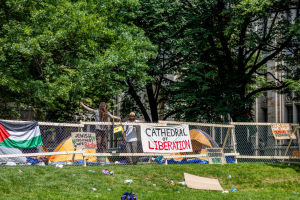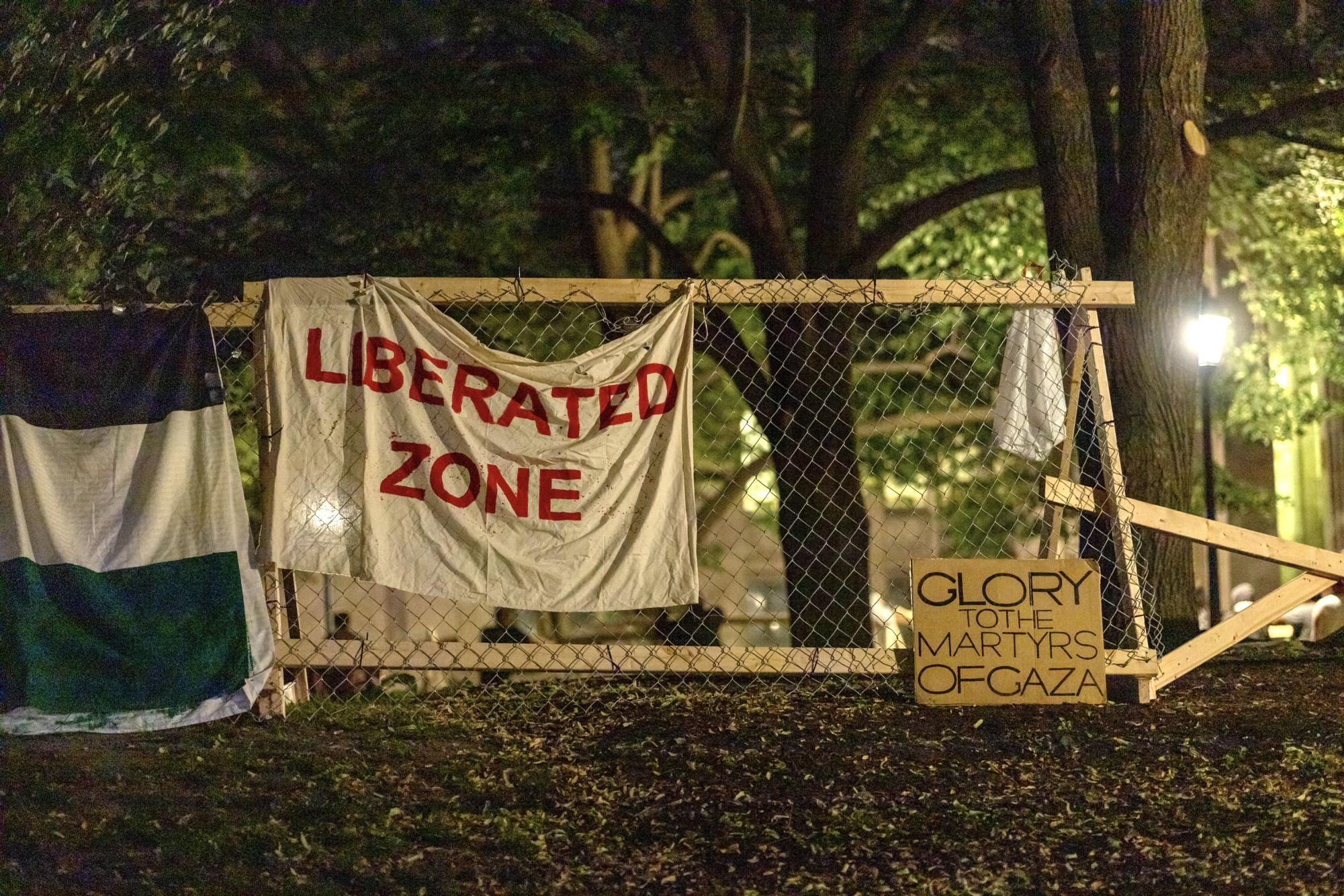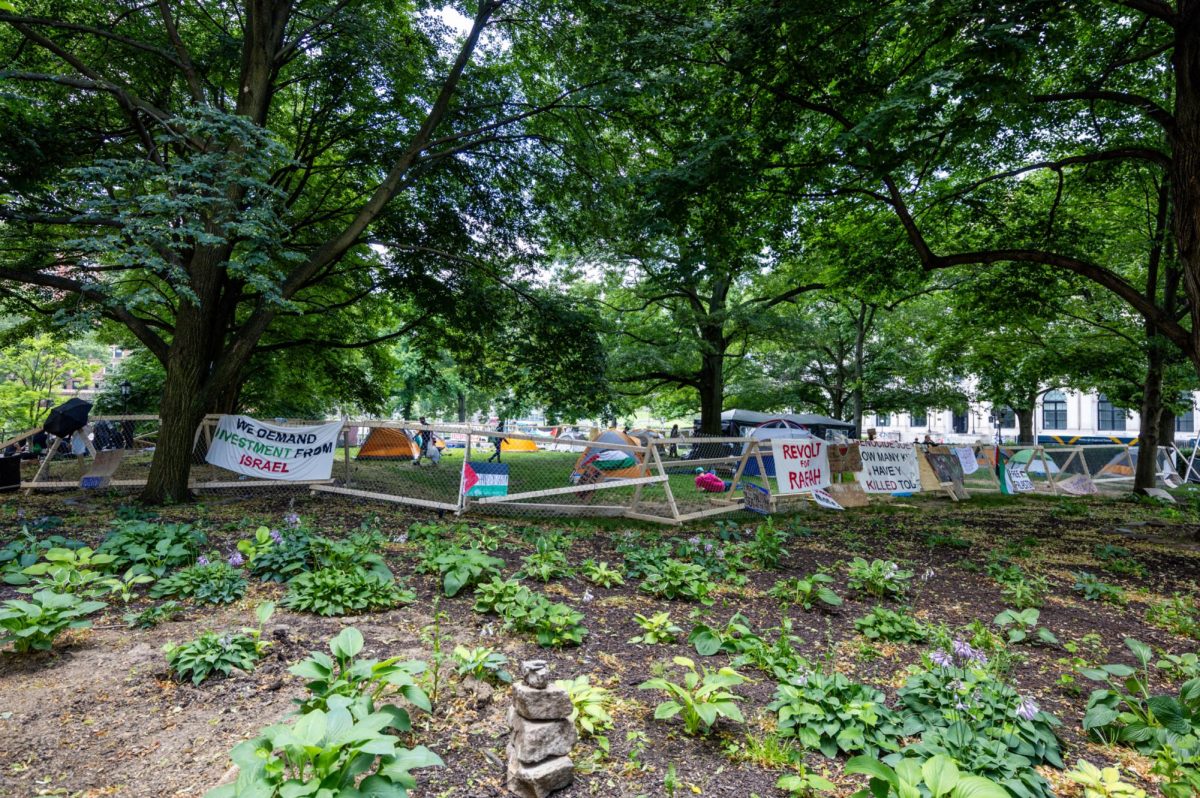The “Palestine solidarity encampment” on the Cathedral of Learning lawn is entering its second day, despite a more active response from police Sunday night and Monday morning. The protesters are demanding that Pitt “disclose and divest” from all ties to Israel during its ongoing war with Hamas in Gaza.
Pitt chancellor Joan Gabel issued a statement at 2:30 p.m. today in which she addressed the Pitt community regarding the protests. Gabel said her goal is for a “peaceful resolution,” and that she maintains her support for free speech.
“Now more than ever, we want to express our commitment to free expression and critical inquiry as core to our mission and key to a vibrant university environment,” Gabel said.
Gabel also claimed that many of the protesters do not have ties to the University, saying that “none of these leaders [of the demonstration] are students, and their affiliations are with organizations that have no connection with the University in any capacity.”
The Pitt News is unable to verify Gabel’s statements regarding encampment leaders’ affiliations with Pitt at this time.
Around 9:30 p.m. on Sunday night, police began constructing metal barricades around the protesters’ own wooden barricades. Some of the protesters are accusing the police of attempting to block food and water supplies from going into the encampment. Pitt Students for Justice in Palestine posted in an Instagram story that the police were “blocking food and water and trying to encircle the camp.” Six different police departments were present at last night’s demonstration, including campus, city, county and state agencies, as well as Carnegie Mellon and Carlow police, according to University spokesperson Jared Stonesifer.
In a video taken by The Pitt News, police can be seen confiscating the protesters’ water and ice supplies. The officers dumped the ice and cut open water bottles to dump them out. It is unclear which department the officers who dumped the water work for.
The University did not respond to questions regarding the purpose for the barricades or why police are restricting food and water from entering the encampment.
The police and protesters also engaged in a brief skirmish near the encampment on the Fifth Avenue side of the Cathedral around 11 p.m. In a video co-posted by several Pro-Palestine organizations, police can be seen pushing a protester off of a short flight of stairs while the officers attempted to push the crowd back from an entrance to the Cathedral on the Fifth Avenue.
Stonesifer said that protesters violated several University policies, which resulted in the increased police presence.
“This demonstration is markedly different from the largely peaceful protest in Schenley Plaza in April and, in comparison, has included destruction of property and other actions that do not lay the foundation for peaceful advocacy or open dialogue,” Stonesifer said. “Those in attendance have violated several University policies and have failed to follow police directions to disperse.”
Ilyas Khan, a junior at Carnegie Mellon and the lead organizer for the Sunrise Movement, believes that the police used “excessive force” on the protesters. Khan, who joined the protest outside of the encampment, also criticized Gabel for not addressing the protesters’ demands.
“[The police] have walls set up to prevent people from getting food, water and sanitary material into this encampment,” Khan said. “If Joan Gabel would like to declare war on her students by not showing up, that is what she is doing. She is deciding that her students do not matter to her or the University administration.”

Several community organizations and leaders also hosted a press conference on Monday at 12 p.m. where they expressed support for the protesters in the encampment and echoed their goals. Carl Redwood, a community activist and representative from the Pittsburgh Black Worker Center, said that the organizers were there to “show our support for the students here at the University of Pittsburgh this encampment, who are demanding that the University divest from Israel.”
Some of the speakers also called out the police for their actions against the protesters. Tanisha Long, the Allegheny County Community Organizer for the Abolitionist Law Center, condemned the police for restricting the protesters’ access to essential items and for arresting one of the demonstrators.
“Last night, I witnessed atrocious behavior by six different police departments,” Long said. “These actions by the University of Pittsburgh are disproportionate, they are unacceptable and they are violent.”
According to the protesters, the University has yet to speak with them about their demands. Kate Daher, a member of the Pittsburgh-Palestine Solidarity Committee and a Pitt alumnus, said that the University is “ignoring their students.”
“I graduated from this university and I want the University to do the right thing and meet with its students,” Daher said. “I am amazed that a Chancellor [Joan Gabel] that makes almost a million dollars per year can’t sit down with these students and talk about their demands.”
Khan said that they believe the protesters will “remember” both Pitt and Carnegie Mellon’s actions during these demonstrations.
“At [Carnegie Mellon] we will remember that [Chancellor Farnam Jahanian] does not stand with us. At Pitt, we will remember that Joan Gabel does not stand with us,” Khan said. “And when the time comes for it, we will makes sure that our lived collective memory is acted upon.”
CMU students previously staged a walkout on their campus in November and have been active in the last two protests on Pitt’s campus.



